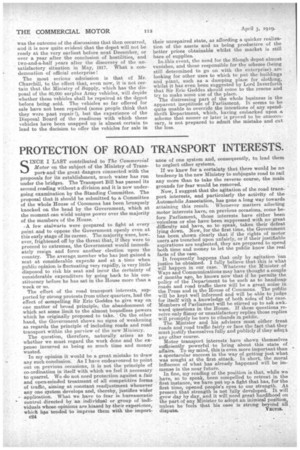PROTECTION OF ROAD TRANSPORT INTERESTS.
Page 2

If you've noticed an error in this article please click here to report it so we can fix it.
SINCE I LAST contributed to The Commercial Motor on the subject of the Ministry of Tranaporleand the great dangers connected with the proposals for its establishment, much water has run tinder the bridges. The Transport Bill has passed its second reading without a division and it is now undergoing examination by the Standing Committee. The proposal that it should be submitted to a Committee of the whole House of Commons has been brusquely knocked on the head by the Government, which at the moment can wield unique power over the majority of the members of the House. '
• A few stalwarts were prepared to fight at every point and to oppose the Government openly even at this early stage of its career. The majority were, however, frightened off by the threat that, if they were to proceed to extremes, the Government would immediately resign and force another election upon the country. The average member who has just gained a seat at considerable expenAe and at a time when public opinion is fluctuating very rapidly, is very little disposed to risk his seat and incur the certainty of considerable expenditure by going back to his constituency before he has sat in the House more than a week or so.
The effort of the road transport interests, supported by strong protests from other quarters, had the effect of compelling Sir Eric Geddes to give way on one matter of broad principle, the abandonment of which set some limit to the almost bonndless powers which he originally proposed to take. ' On the other hand, the Government shows no signs of weakening as regards the principle of including roads and road transport within the purview of the new Ministry.
The question, therefore, naturally arises as to whether we must regard the work done and the expense incurred as being so much time and money wasted.
In my opinion it would be a great mistake to draw any such conclusion. As I have endeavoured to point out on previous occasions, it is not the principle of co-ordination in itself with which we feel it necessary to quarrel. We do not need protection against a .fair and open-minded treatment of all competitive forms of traffic, aiming at constant readjustment whenever any one system develops and, thereby, justifies wider application. What we have to fear is bureaucratic ' control directed by an individual or group of individuals whose opinions are biased by their experience, which has tended to impress them with the import c24 mice of one system and, consequently, to lead them to neglect other systems.
If we knew for a certainty that there would be no tendency in the new Ministry to subjugate road to rail any more than to take the reverse course, the main grounds for fear would be removed. Now, I suggest that the agitation of the road transport interests, and particularly the activity of the Automobile Association, has gone a long way towards attaining this result. Whenever matters affecting motor interests have on previous occasions, come before Parliament, those interests have either been voiceless or else have been suppressed with no great difficulty and have, so to speak, taken their 'defeat lying down. Now, for the first time, the Government has been shown clearly that if the rights of motor users are trenched upon unfairly, or if their justifiable aspirations are neglected, they are prepared to spend both time and money to let the public know the real facts of the ease.
It frequently happens that only by agitation -can justice be obtained. I fully believe that this is what will happen in our case. Whatever the Minister of Ways and Communications may have thought a couple of months ago, he knows now that if he permits the policy of the D,epartm.ent to be such as to handicap roads and road traffic there Will be a great noise in the Press and in the House of Commons. The public will be kept well informed and will be able to judge for itself with a knowledge of both sides of the case. Members of Parliament will be stirred up to ask awkward questions in the House. If these questions receive only flimsy or unsatisfactory replies those replies will promptly be torn to ribands in public. The Minister and his advisers must either treat roads and road traffic fairly or face the fact that they must justify themselves fully and publiclyif they adopt any other course. Motor transport interests have shown themselves sufficiently powerful to bring about this state of affairs. To my mind, this is even more important than a spectacular success in the way of getting just what was sought at the first attack. In short, the moral influence of what has already happened will be immense in the near future.
In fine, my reading of the position is that, while we have, so to speak, been compelled to retreat in the instance, nstance, we have put up a fight that has, for the first time, opened people's eyes to our strength. At present that strength is not 'fully developed. It will grow day by day, and it will need great hardihood on the part of any Minister to adopt an inimical position, unless he feels that his case is strong all dispute. WTI&






















